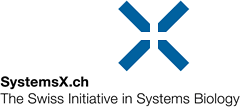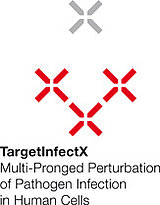TargetInfectX
Multi‐Pronged Perturbation of Pathogen Infection in Human Cells
Resistance to antibiotics is very rapidly increasing worldwide, and there are less and less new antibiotics developed. There is thus an urgent and unmet medical need for the development of innovative approaches to treat infectious diseases. TargetInfectX aims at using RNA interference (RNAi) by small inhibitory RNAs (siRNAs) to (i) identify human proteins as general targets for anti-infective intervention and (ii) to evaluate the potency of specific siRNAs for anti-infective treatment.
The discovery of antibiotics in the first half of the 20th century triggered the development of many anti-infectives. These collectively enabled the treatment of most infectious diseases, thus greatly reducing morbidity and mortality. However, due to the increasing emergence of (multi-)drug resistant pathogens and a simultaneous draining of development pipelines for conventional anti-infectives in the pharmaceutical industry, we are now in danger of facing a post-antibiotic era.
This project aims at using RNA interference (RNAi) and complementary technologies to comprehensively discover and understand the role of human factors involved in pathogen infection and to test whether combinatorial knock-down of human factors by individual small inhibitory RNAs (siRNAs) can effectively interfere with pathogen infection.
TargetInfectX builds on the results and knowledge gained during the InfectX RTD project (2009-2013) but will have far reaching goals. Within InfectX we have acquired a large RNAi dataset for infection of human cells by various pathogens and developed models to interpret such data. However, to date we have explored only a fraction of the phenotypic information present in our image-based assays, and we will thus extract a rich set of phenotypic features on the single‐cell level to identify human proteins linked to basic cell behaviors involved in the response to pathogen intrusion. Moreover, we realized that small interfering RNAs (siRNA) provide potent multi‐pronged perturbations of cellular functions which may have therapeutic potential. On the translational side, we thus will explore the potential of siRNAs as novel combination therapy to treat infection in appropriate animal models.
The specific goals of this project are:
the analysis of multiple phenotypic features on the single-cell level in order to establish links with molecular pathways relevant to the infection process;
- the exploration of off-target effects and gene regulation mediated by siRNA seed sequences;
- the deconvolution of on and off-target effects to map genes to specific phenotypes;
- the expansion of the knowledge gained to in vitro and in vivo models in order to discover new ways of fighting infection;
- the collaboration with external partners via a platform involving software, analysis tools and models.
| Principal Investigator | Prof. Christoph Dehio, Biozentrum, University of Basel |
| Involved Institutions | University of Basel, ETH Zurich, University of Zurich |
| Number of Research Groups | 6 |
| Project Duration | Jan. 2014 – Dec. 2014 (Dec. 2017 pending review) |
| Approved SystemsX.ch Funds | CHF 2.999 million |
Updated July 2014


